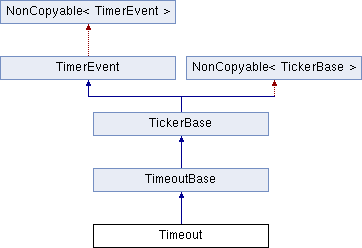- mbed
- Timeout

Public Types | |
| using | clock = HighResClock |
| Clock to use with attach_absolute, guaranteeing running only while attached or manually locked. More... | |
Public Member Functions | |
| HighResClock::time_point | scheduled_time () const |
| template<class F > | |
| void | attach_absolute (F &&func, HighResClock::time_point abs_time) |
| Attach a function to be called by the Timeout, specifying the absolute time. More... | |
| std::chrono::microseconds | remaining_time () const |
| Return time remaining until callback. More... | |
| template<typename F > | |
| MBED_FORCEINLINE void | attach (F &&func, float t) |
| Attach a function to be called by the Ticker, specifying the interval in seconds. More... | |
| void | attach (Callback< void()> func, std::chrono::microseconds t) |
| Attach a function to be called by the Ticker, specifying the interval in microseconds. More... | |
| void | attach_us (Callback< void()> func, us_timestamp_t t) |
| Attach a function to be called by the Ticker, specifying the interval in microseconds. More... | |
| void | detach () |
| Detach the function. More... | |
| using clock = HighResClock |
|
inherited |
Attach a function to be called by the Ticker, specifying the interval in seconds.
The method forwards its arguments to attach_us() rather than copying them which may not be trivial depending on the callback copied. The function is forcibly inlined to not use floating-point operations. This is possible given attach_us() expects an integer value for the callback interval.
| func | pointer to the function to be called |
| t | the time between calls in seconds |
10ms rather than 0.01f.
|
inherited |
Attach a function to be called by the Ticker, specifying the interval in microseconds.
| func | pointer to the function to be called |
| t | the time between calls in micro-seconds |
| void attach_absolute | ( | F && | func, |
| HighResClock::time_point | abs_time | ||
| ) |
Attach a function to be called by the Timeout, specifying the absolute time.
| func | pointer to the function to be called |
| abs_time | the absolute time for the call, referenced to HighResClock |
|
inherited |
Attach a function to be called by the Ticker, specifying the interval in microseconds.
| func | pointer to the function to be called |
| t | the time between calls in micro-seconds |
10ms rather than 10000.
|
inherited |
Detach the function.
|
inherited |